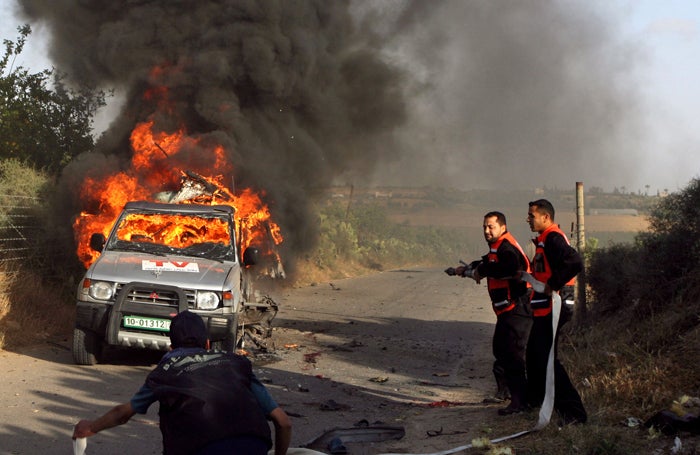Israel pressed to reveal why army killed cameraman

Your support helps us to tell the story
From reproductive rights to climate change to Big Tech, The Independent is on the ground when the story is developing. Whether it's investigating the financials of Elon Musk's pro-Trump PAC or producing our latest documentary, 'The A Word', which shines a light on the American women fighting for reproductive rights, we know how important it is to parse out the facts from the messaging.
At such a critical moment in US history, we need reporters on the ground. Your donation allows us to keep sending journalists to speak to both sides of the story.
The Independent is trusted by Americans across the entire political spectrum. And unlike many other quality news outlets, we choose not to lock Americans out of our reporting and analysis with paywalls. We believe quality journalism should be available to everyone, paid for by those who can afford it.
Your support makes all the difference.The Israeli military has come under renewed pressure to explain why its tank shells killed a Reuters cameraman and eight other Palestinians on a road in Gaza two months ago.
Reuters is pressing for immediate release of the military's internal inquiry findings after an independent report for the London-based news agency found that there had been was no militant activity in that area.
Fadel Shana, 24, was killed on 16 April by flechette darts that burst from a tank shell as he was filming about a mile away from the tanks and in clear view of them. Eight bystanders aged between 12 and 20 were also killed, involving two tank shells.
Mr Shana's car and body armour carried press markings, and none of the other casualties were armed.
The Israeli army has not yet produced a detailed account but has said its soldiers did nothing wrong. Mark Thompson, Reuters' Middle East managing editor, has written to the military to ask how the soldiers involved failed to identify Mr Shana as a cameraman or the other victims as children and other civilians.
The investigation carried out for the agency found that the Reuters crew had half an hour earlier driven past a point 700 metres from the tanks.
Rejecting a request that IDF officers relay information to field commanders from journalists about their movements in Gaza for their safety, the military said last month: "There will be no co-ordination of press movement and activity in the areas of IDF operations."
Major Avital Leibovich, an IDF spokeswoman, said: "We are in the process of checking a few more details in order to complete the picture. As soon as we have the conclusions we will share them."
Join our commenting forum
Join thought-provoking conversations, follow other Independent readers and see their replies
Comments